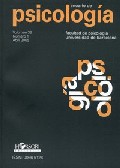Philosophical, theoretical and empirical foundations of Acceptance and Commitment Therapy
Abstract
This article has two main purposes. The first one is to present the philosophical, theoretical, and empirical underpinnings of Acceptance and Commitment Therapy (ACT). The second is to outline the importance of philosophy and theory in order to build an empirical clinical psychology that copes progressively with the needs of the field. To accomplish these purposes, we have structured the article in three distinct sections. In the first one, we will explore the philosophical assumptions of ACT, known as Functional Contextualism. In the second section, we will offer a brief history of the appliedand theoretical tradition of ACT, Behavior Analysis, and Relational Frame Theory (RFT), a modern account of human language and cognition. Finally, we will present some clinical outcomes that, although preliminary, exemplify the broad range of health problems and psychological disorders for which the ACT model has shown to have positive results. Overall we will offer a unified version of the ACT/RFT model that interconnects its multiple dimensions.Downloads
Published
2007-07-05
Issue
Section
Articles
License
The authors who publish in this journal agree to the following terms:
Authors transfer to the publisher all copyright for the full term of protection and for all the world.
The authors can post a copy of their articles in accordance with the policy of free access to the journal.


